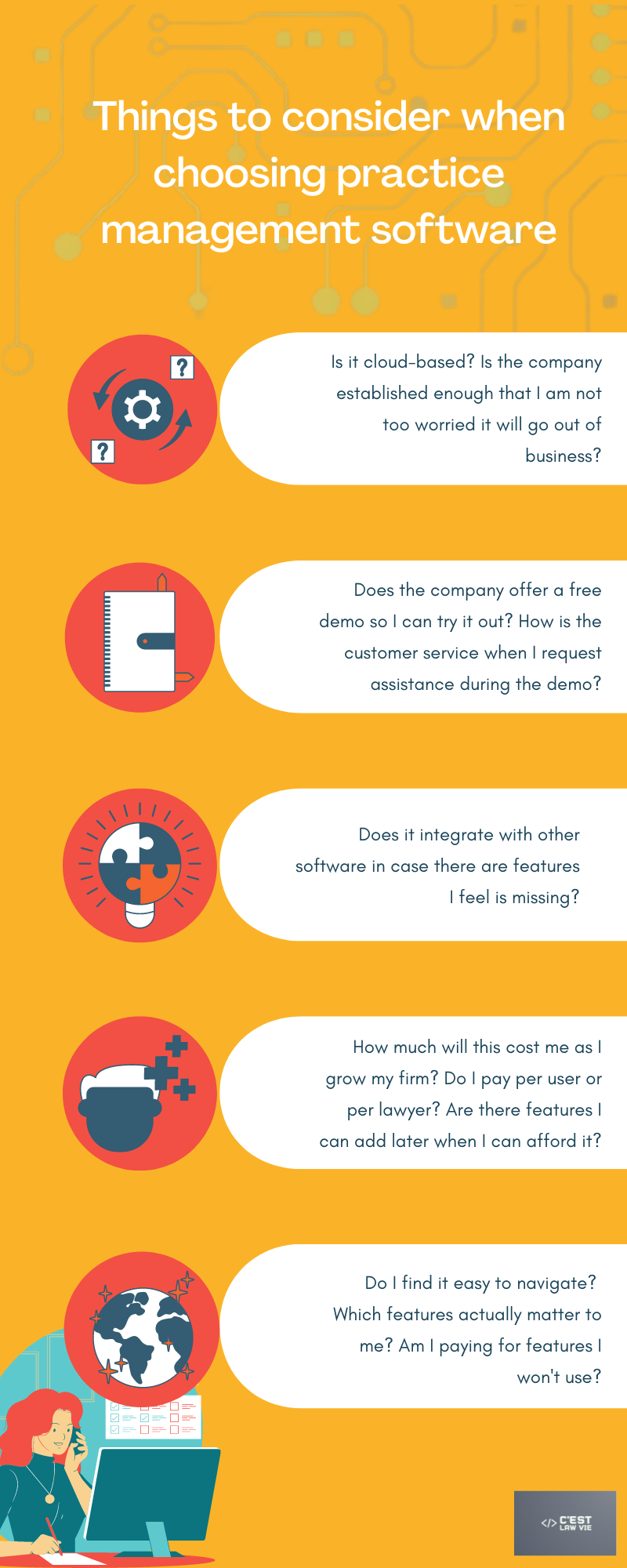How to chose practice management software

With so many practice management options, it's tough to decide!
I started my practice in the beginning of 2013 when I had only two choices for practice management software: PC Law (which was desktop and too costly for my fledgling start-up) or Clio (a cloud-based but relatively new offering that was weaker on accounting). I chose the latter and have no regrets. I'm mostly grateful I didn't have to experience the decision fatigue of lawyers and paralegals who are starting out today.
Since I opened my firm, a plethora of options have come to the market. I have followed with interest the evolution of software and the ways they try to distinguish themselves. From their websites, it is hard to tell them apart. Most of them offer the same primary features: they are cloud-based, let you docket and bill, and have calendar syncing. Most appear to be reasonably secure, can generate trust records, and let you track time with built-in timers.
What I've learned is, much like choosing where to work, it is the small things that make one option unique in a sea of competition. As Clio has evolved over the years, I've appreciated the ability to create numerous bills at the same time (batch billing) and send invoice reminders (something I used to do with separate, and not inexpensive, software I had to integrate). I also love that it integrates with LawPay so that when a client pays a bill, the record is created automatically (I'm a sucker for all things automation).
Some of the practice management software options have intuitive interfaces (e.g. Clio Manage, Practice Panther), while others are overwhelming at first but incredibly customizable (e.g. Filevine).
Some win on price (e.g. uLaw) or customer service, while others (like CosmoLex) excel on bookkeeping (see what I did there?).
There are many more I have not tried (Rocket Matter, Soluno and MyCase, to name a few) that offer an array of features such as client portals, document management, custom reports, and/or assistance switching over.
Each takes time to learn, though some are simpler than others.
No matter what you choose, if you have a good number of files it will almost certainly be worthwhile to have software that can generate invoices, trust ledgers and trust listings. If you have a practice with a handful of clients and only a few transactions, it might be feasible to maintain records on your own (at least in the beginning while you are trying to keep overhead low). I have spent a fair bit of time looking at the different platforms and have concluded that since most do the primary tasks fine, it really comes down to signing up for demos and seeing which little things you love and hate. You could spend days creating spreadsheets comparing features, and by then you may be suffering from analysis paralysis. So my two cents is to just jump in and do a demo. Make a few fake files and run through the basic steps - create a client and matter, add trust funds, docket your time, generate an invoice, and run a report. In about an hour you should have a feel for whether the option is worth seriously considering, or if it would be better to reject it and move on. And you do NOT have to try every option before you commit.
Much like the rest of entrepreneurship, picking your practice management software is about performing some research and then learning as you go.

Categories: : Software, Technology
 Lisa Feldstein
Lisa Feldstein 